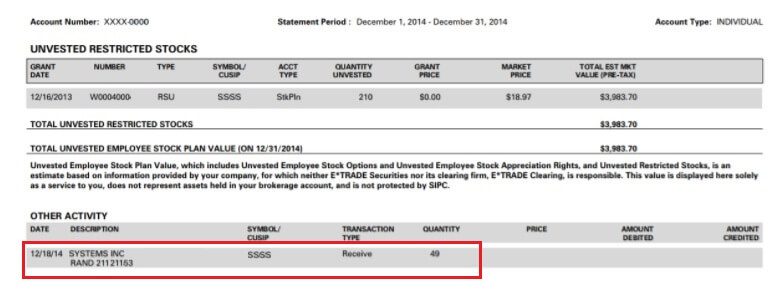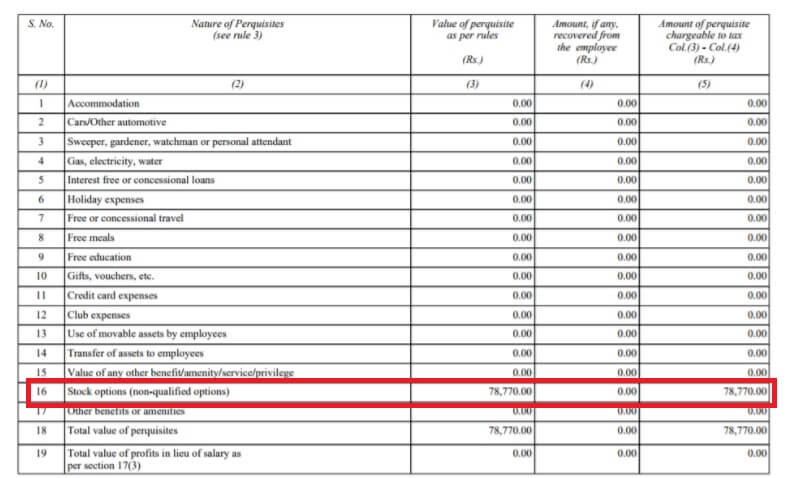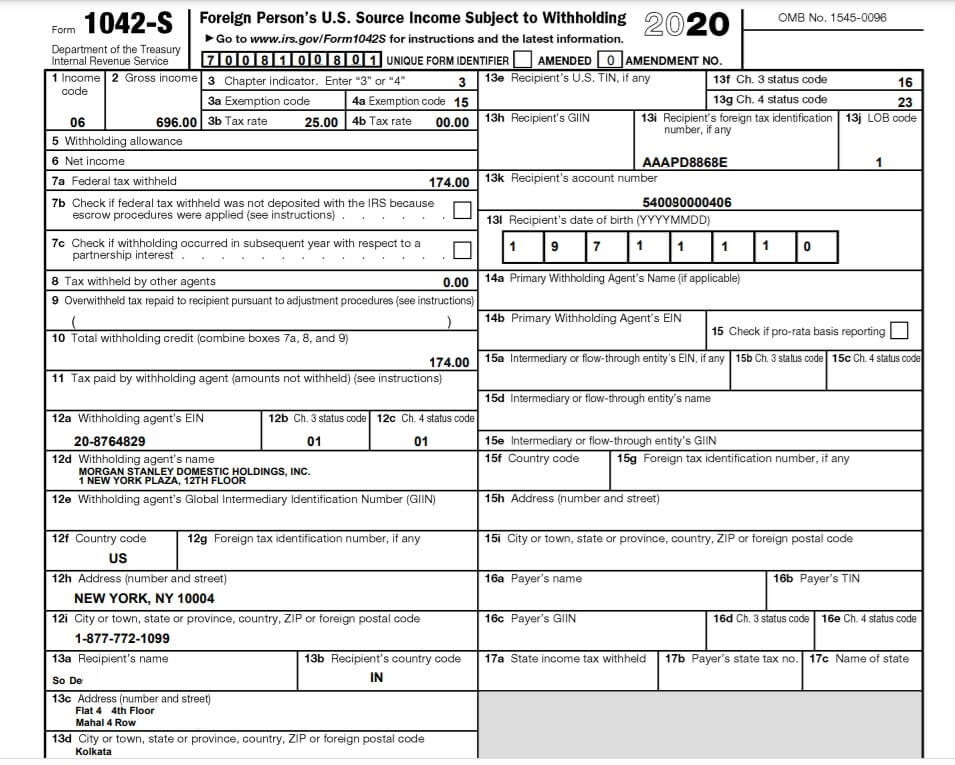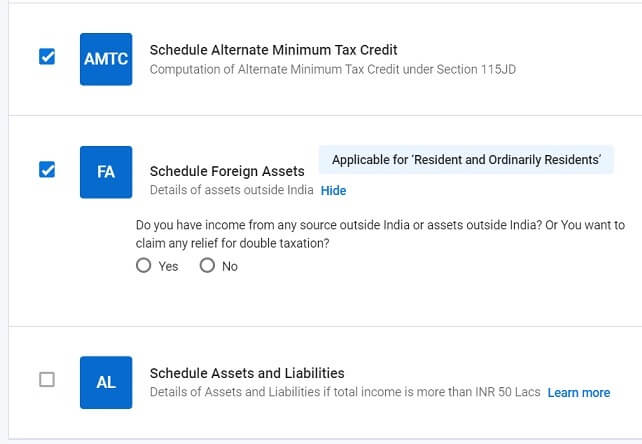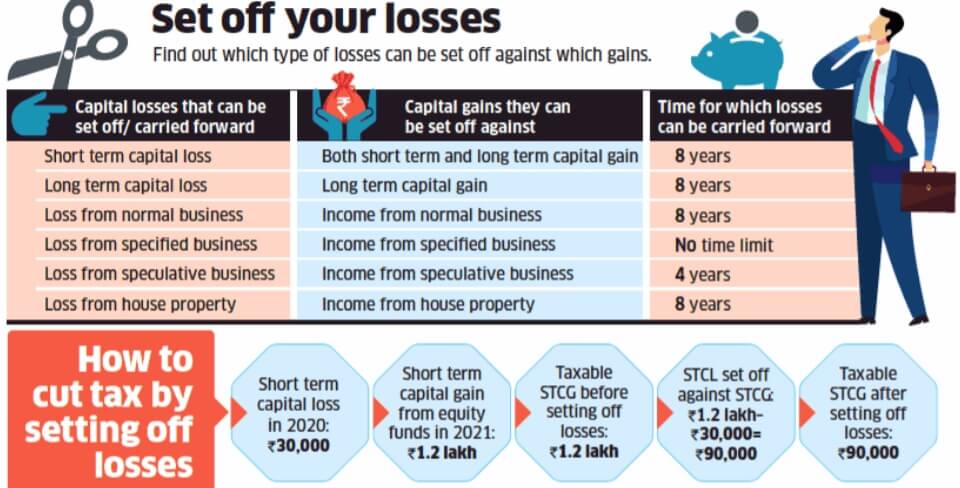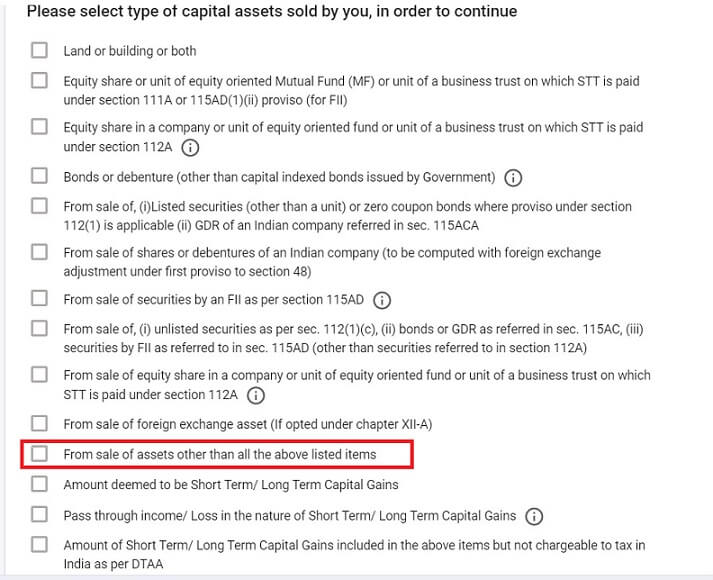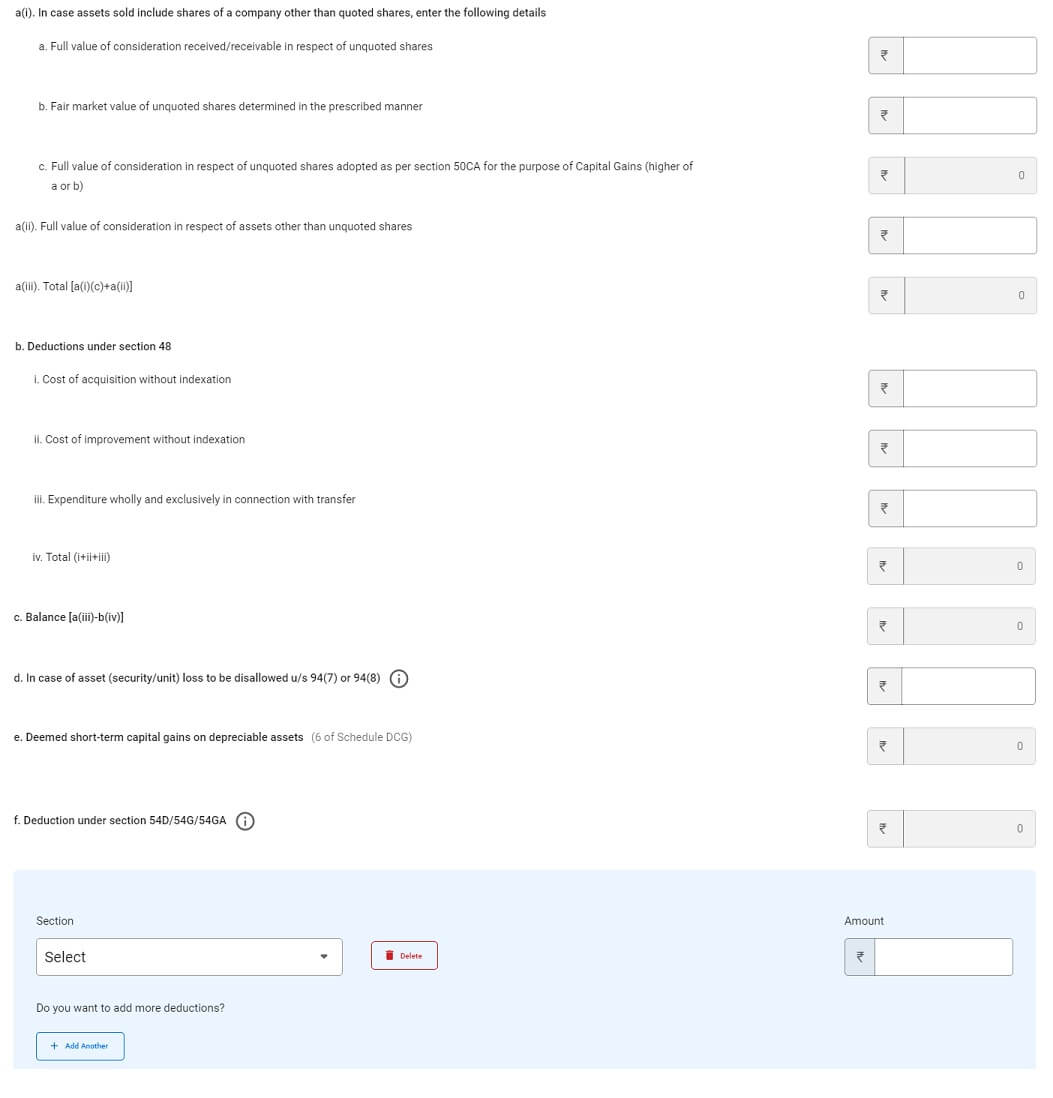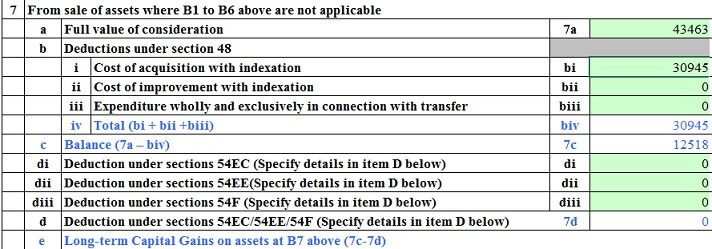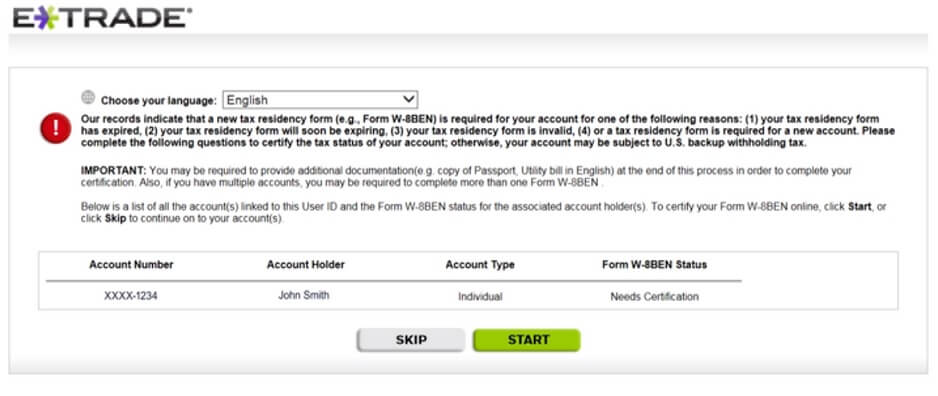RSU or Restricted Inventory Items are shares of the corporate given to workers freed from value however with some restrictions. What are RSUs? Why are RSUs given? What’s the vesting date? When are RSU taxed? Is there a capital achieve on promoting RSU? What’s the capital achieve from promoting RSU? We will reply these questions by speaking concerning the RSU of an American MNC.
Overview of RSU, Tax, and ITR
RSU or Restricted Inventory Items are shares of the corporate given to worker freed from value however with some restrictions(because the title suggests)
- On Granting of RSU no tax implication. It’s only a promise by the employer
- On the vesting day, the given proportion of RSUs are transferred to worker’s buying and selling account.
- Worker has to pay tax based mostly on his earnings slab.
- the worth of shares is taken into account as Perquiste in India and seems in Kind 16. The market worth of the shares vested (variety of shares vested x Honest Market value X Conversion from Greenback to Indian Rupee) is added to the worker’s taxable earnings as perquisites. The worth at which Inventory is given to you is known as because the Honest Market Worth
- Tax could be deducted within the different nation.
- US MNCs with workers in India usually submit W-8BEN to US brokers to keep away from any withholding associated to US taxes.
- Indian firms deduct % of shares as tax.
- There may be no double taxation as tax is paid from the sale of shares.
- One must declare shares obtained as RSU as Capital Asset in Schedule FA(International Property) of ITR2, ITR3, ITR4.
- ITR1 does NOT have the schedule for International Property. So in case you RSU, ESPP in MNC you can not file ITR1.
- It’s best to fill in details about all of the RSUs you could have as of the monetary yr of the MNC
- It’s best to present earnings you derived from it(Dividend, Capital Positive factors).
- If tax for RSU has been deducted by promoting of shares, Variety of shares talked about ought to be after the deduction. So if 100 shares bought vested and 30 shares had been deducted then you should present solely 70 shares in International Property.
- One can solely promote the RSUs which can be vested. On the sale of the vested shares, the revenue earned is a capital achieve and is subsequently taxable in India.
- For RSUs, the distinction between the vesting value or the Honest Market Worth and the sale value is the as capital achieve
- For RSUs, the acquisition date is the vesting date.
- Because the RSUs of the MNCs are usually not listed on the Indian inventory trade and no STT(Safety Transaction Tax) is paid so the definition of a long run and short-term capital features is completely different from the shares listed on Indian inventory trade like BSE and NSE.
- Quick-term capital belongings – when offered inside 24 months of holding them. Quick-term features are taxed at worker’s earnings tax slab charges
- Lengthy-term capital belongings – when offered after 24 months of holding them. Lengthy-term features are taxed at 12.5% (earlier than Lengthy-term features are taxed at 20% with indexation earlier than Funds 2024)
- This capital achieve should be declared in Schedule CG of ITR2 ITR3, ITR4 for tax functions.
- Advance Tax ought to be paid for revenue/capital achieve of greater than 10,000 Rs.
The reporting could be as under for overseas shares on
- Schedule CG for Capital achieve on Sale of Shares
- Schedule OS for Dividend earnings
- Schedule FSI and Schedule TR for claiming the overseas tax credit score in case of double taxation aid
- Schedule FA: Particulars of holding of overseas shares/securities
RSU or Restricted Inventory Items
RSU or Restricted Inventory Items are shares of the corporate given to worker freed from value however with some restrictions(because the title suggests). The restriction is that although an worker is granted RSUs on a particular day (reminiscent of when he joins an organization or will get a promotion) he will get possession of the shares over a time frame. It’s an incentive to the worker to remain within the firm and to revenue from the expansion of the corporate. When the shares are awarded to the worker based on the schedule, it’s thought of as perquisite earnings and added to common earnings. When one sells the RSUs one capital achieve comes into play and one could need to pay tax relying on the interval of holding of RSU. Phrases related to RSU.
- Grant date: The date on which the shares are allotted
- Vesting date: the date on which the shares get transferred to the worker.
Say if one is granted 100 RSUs to be vested over 3 years within the ratio 34%/33%/33% on 23 Nov 2023. Then 34 RSUs (34%) will vest on 23 Nov 2024 and 33 every (33%) on 23 Nov 2025 and 23 Nov 2026 respectively. In the event you depart the corporate on 1 December 2025, then it is possible for you to to promote solely 34 shares and the remaining 66 shares will return to the corporate. In the event you stick round for one more month, then it is possible for you to to promote 67 shares (34 + 33) as one other 33 shares will vest on 23 Nov 2025.
So if one is granted 100 RSUs to be vested over 4 years within the ratio 25%/25%/25%/25% on 16 Dec 2023. Then 25% of RSUs i.e 25 shares of the corporate will vest on 16 Dec 2024, on 16 Dec 2025, 16 Dec 2026 and 16 Dec 2027 respectively. (If the vesting day is vacation then the shares vest on subsequent working day)
The opposite form of incentives provided by the businesses are ESPP and ESOP.
Our article What are Worker Inventory Choices (ESOP) explains ESOP intimately.
Our article Worker Inventory Buy Plan or ESPP explains ESPP intimately.
Tax when RSUs are Granted
On Granting of RSU no tax implication. It’s only a promise by the employer.
Tax when RSUs are Vested
Vesting date is the date on which the predefined proportion of shares get transferred to the worker based on the predefined schedule. Say one is granted 100 RSUs to be vested over 4 years within the ratio 25%/25%/25%/25% on 16 Dec 2023. Then 25% of RSUs i.e 25 shares of the corporate will vest on 16 Dec 2024. On the vesting day, the given proportion of RSUs are transferred to worker’s buying and selling account, for instance, eTrade or Charles Schwab account for an American MNC. On Vesting, one has to handle following issues
- one has to pay tax based mostly on earnings slab.
- the worth of shares is taken into account as earnings in India.
Tax on RSU
Firms are obligated to deduct taxes for RSUs vested. The commonest technique of deducting tax is share withholding, the place the corporate withholds sufficient shares to cowl the tax legal responsibility and deposits internet shares to your brokerage account. This feature is known as as Promote to cowl. Some firms allow different strategies, reminiscent of money or sell-to-cover transactions, that are defined under. Completely different strategies could also be supported by buying and selling firms like Schwab or eTrade, however solely the strategies licensed by your organization shall be out there to you.
The varied choices to deduct tax on broking web site the place the RSUs are held are as follows:
- A sell-to-cover That is the default choice the place TDS (as per your earnings slab) proportion of the vested shares are offered instantly and the quantity is paid to the federal government as tax. The remaining 70% of the vested shares stay in your account and you’ll promote them later everytime you need. Actully tax deducted is as per the earnings slab however as in a lot of the firms, the RSUs are provided above a sure degree the place earnings is available in 30% earnings slab.
- A same-day sale: All of the vested RSUs are offered instantly. Proportion of the sale proceeds are deducted and paid as tax to the federal government and the remainder of cash will get wired to your account. You don’t any shares after this.
- A money train lets you pay the tax and no shares are offered. The cash to pay should be out there in your brokerage account.
The default choice is Promote to Cowl therefore If 70 RSUs are vested you then would get solely 49 shares in your account attributable to taxation. 30% of 70 = 21 which is taken as tax. So no of shares within the account turns into 70-21=49.
RSUs as Perquisite Earnings in India
For RSUs, the acquisition value or buy value is zero and so your complete market worth of vested shares is handled as earnings in India as a perquisite. The market worth of the shares vested (variety of shares vested x Honest Market value X Conversion from Greenback to Indian Rupee) is added to the worker’s taxable earnings as perquisites. The worth at which Inventory is given to you is known as because the Honest Market Worth. All of the shares which can be vested are used to calculate the Perquiste Earnings which incorporates the shares which had been offered for tax. if 70 RSUs are vested you then would get solely 49 shares in your account attributable to taxation however all of the 70 shares shall be used to calculate the perquiste earnings.
It’s declared in his Kind 12BA for the yr and is offered in your Kind 16, as proven within the photographs under. The Indian firm provides it to worker’s Earnings and fees Tax accordingly.
Our article Understanding Kind 12BA give particulars of Perquisites given to an worker intimately.
Our article Understanding Kind 16: Tax on earnings explains the Kind 16. Earnings Tax Kind 16 is a certificates from the employer which certifies that TDS has been deducted from worker’s wage by the employe
Are RSU’s Taxed Twice?
Quick Reply is RSU’s are usually not taxed twice. If they might have been taxed twice you’d have Govt doc of the nation deducting tax saying that tax has been deducted. Like Kind 16/Kind 16A supplied by Indian Govt or Kind 1042-S supplied by US when the tax is deducted on the dividend of US compnaies.
An worker (Resident Indian) working in India in a subsidiary of a US Firm is given RSU or Restricted Inventory Items of the dad or mum firm.
When the shares are vested, some shares are withheld (Promote to cowl) to satisfy tax legal responsibility in US and after decreasing these shares, the stability is given to the worker.
Indian firm additionally calculates prerequisite based mostly on FMV on the full variety of shares together with withheld shares and TDS is deducted. That is mirrored in Kind 16 Half B.
So are RSUs are taxed twice. About 65.22% worth is consumed in tax.
Is double taxation achieved by the corporate is appropriate?
Can DTAA advantages be availed for a refund?
No, RSUs are usually not taxed twice is what my firm says. Simply since you are seeing that in your Kind 16 and your brokers statements, it doesn’t imply that its been deducted twice.
Within the instance above, Reader Smriti defined fantastically.
100* FMV was added to your prerequisite to point out it as part of earnings. it simply means you had been paid a 100*FMV quantity by the corporate( in type of shares).
66 shares are deposited to your brokerage account.
The remaining shares (100-66 = 34) are thought of to be offered by the dealer in your behalf and the quantity obtained from that is paid as tax.
All these calculations are a part of your wage prerequisite and therefore, will present in your wage slip because the tax you’re paying to Govt of India.
The employer will not be deducting tax twice. it’s simply including all the small print within the payslip.
We’ve got heard that Proof is within the pudding or present me the proof. If the tax had been deducted by the overseas firm then they should present paperwork like Kind 16/Kind 16A in India and Kind 1042-S within the US. The Pattern Kind 1042-S from our article How are Dividends of Worldwide or International Shares taxed? How you can present in ITR is proven under.
Dividend earnings from overseas shares
Dividend earnings earned from overseas shares is taxed as per Earnings Tax slabs underneath the top Earnings from Different Sources.
In Schedule TR, you should present a abstract of tax aid that’s being claimed in India for taxes paid outdoors India in respect of every nation. This schedule captures a abstract of detailed info furnished in Schedule FSI.
Within the case of sure ESOPs, a person might also obtain dividend-equivalent earnings on unvested shares. These are usually taxed as a part of wage earnings.To find out one’s taxation it’s advisable to have a chat together with your Employer or colleagues.
The Double Taxation Avoidance Settlement or DTAA is a tax treaty signed between India and one other nation in order that taxpayers can keep away from paying double taxes on their earnings earned from the supply nation in addition to the residence nation. At current, India has double tax avoidance treaties with greater than 80 nations all over the world.
Monetary years of various nations
“It’s hereby clarified {that a} taxpayer shall be required to reply the related query (whether or not overseas belongings are held or not) within the affirmative, provided that he has held the overseas belongings and so on. at any time through the “earlier yr”(in India) as additionally at any time through the “related accounting interval”(within the overseas tax jurisdiction), and replenish Schedule FA accordingly.”
Lets take an instance of RSUs of a MNC headquartered in USA which has monetary yr from 1 Jan to 31 Dec. So solely RSUs(ESPPs) acquired between 1 Jan 2022 to 31 Dec 2023 must be reported.
Monetary years for well-liked nations are given under
1. United States: Monetary yr is from January 1st to December thirty first.
2. United Kingdom: Monetary yr is from April sixth to April fifth.
3. Canada: Monetary yr is from January 1st to December thirty first.
4. Australia: Monetary yr is from July 1st to June thirtieth.
5. United Arab Emirates: Monetary yr is from January 1st to December thirty first.
For particulars checkout our article Distinction between Evaluation 12 months and Monetary 12 months, Earlier 12 months,Fiscal 12 months in World
How you can present RSU, ESPP, and International Property in ITR
One wants to point out shares obtained as RSU(ESPP/ESOP) as Capital Asset in Schedule FA(International Property) of ITR apart from ITR1 reminiscent of ITR2, ITR3, ITR4 as proven within the picture under. ITR1 does NOT have the schedule for International Property.
The picture under reveals the case of solely when shares of an organization within the US had been allotted to the worker and the worker has not offered them until submitting of the earnings tax return. To fill this please undergo Perquisite on Inventory Choices report and the break up supplied by your employer on shares allotted to you.
If tax for RSU has been deducted by promoting of shares, the Variety of shares talked about ought to be after the deduction. So if 100 shares bought vested and 30 shares had been deducted then you should present solely 70 shares in International Property. Complete Funding values is the Variety of shares in your account X Honest Market Worth X US greenback inventory value.
When you’ve got bought RSU at completely different instances and also you haven’t offered them then particulars about every allotment you had until 31 Mar of the monetary yr for which you’re submitting ITR needs to be put within the International Property desk.
For instance, your 70 RSUs bought vested in 2020 and 70 in 2021, the details about each the allotments ought to be in International Property.
Schedule for International Earnings in ITR
Distinction between Schedule International Supply Earnings (FSI) and International Property (FA)
Is Schedule FSI required to be stuffed in ITR2?
I’m resident in India. I’ve been allotted inventory choices (of my dad or mum US firm), which have been proven in my Kind 16. Do I additionally want to point out this earnings in Schedule FSI or Schedule FA (International Property)? No Tax has been deducted within the US and I’m not claiming any refund.
- In Schedule International Supply Earnings (FSI), you should report the small print of earnings, which is accruing or arising from any supply outdoors India. FSI schedule is necessary for residents who earned earnings from outdoors India and tax paid outdoors India and to say the good thing about DTAA on such earnings.
How you can choose the Schedules?
Go to Schedule Choice
- Click on Earnings to see the Earnings from Capital Positive factors Schedule. Choose the Schedule
- Click on Earnings to see the International Supply Earnings schedule. Choose the Schedule
- Click on Others to see the International Property Earnings schedule. Choose the Schedule
Particulars to be stuffed in International Asset schedule in ITR2
Particulars to be stuffed are:
- Nation Title and code: The Nation the place the trade on which shares are listed is traded. Ex for somebody working in Amazon or Microsoft, it might be the USA. Code is offered within the dropdown in ITR.
- Nature of asset: Shares
- Nature of Curiosity-Direct/Helpful/proprietor/Beneficiary: Direct
- Date of acquisition: Date on which shares had been allotted
- Complete Funding (at value) (in rupees): Value at which RSU/ESPP was allotted. (Please deduct the variety of shares that had been credited to your account after-tax deduction. Say you had been allotted 70 shares however due to tax solely 49 shares had been credited into your broking account). In instance 49*17.89(FMV)*62.90(USD Trade fee)
- Earnings accrued from such :
- 0, in case you haven’t offered the shares.
- When you’ve got earned a dividend then declare the dividend obtained.
- When you’ve got offered the shares then it’s important to present the revenue/loss obtained from the sale of the shares.
- Nature of Earnings: What sort of Earnings it’s. For International shares not offered it’s Earnings from Wage. For International shares offered it’s earnings from Capital Positive factors.
Desk A3 or Desk D
You may declare it in Desk A3 or Desk D of International Property as proven within the photographs under
Technically it ought to be declared in Desk A3. Further particulars required in Desk A3 are the Peak Worth of funding through the interval, Closing Worth. Closing Worth ought to be as of 31 Mar. These particulars you could find out of your dealer.
In desk A3, the preliminary worth of the funding, the height worth of the funding through the accounting interval, the closing worth of the funding as on the finish of the accounting interval, gross curiosity paid, the full gross quantity paid or credited to the account through the accounting interval,and complete gross proceeds from sale or redemption of funding through the accounting interval is required to be disclosed after changing the identical into Indian forex
However because it requires extra particulars, many individuals do it in Desk D, the rationale being we’re declaring the earnings and account for it.
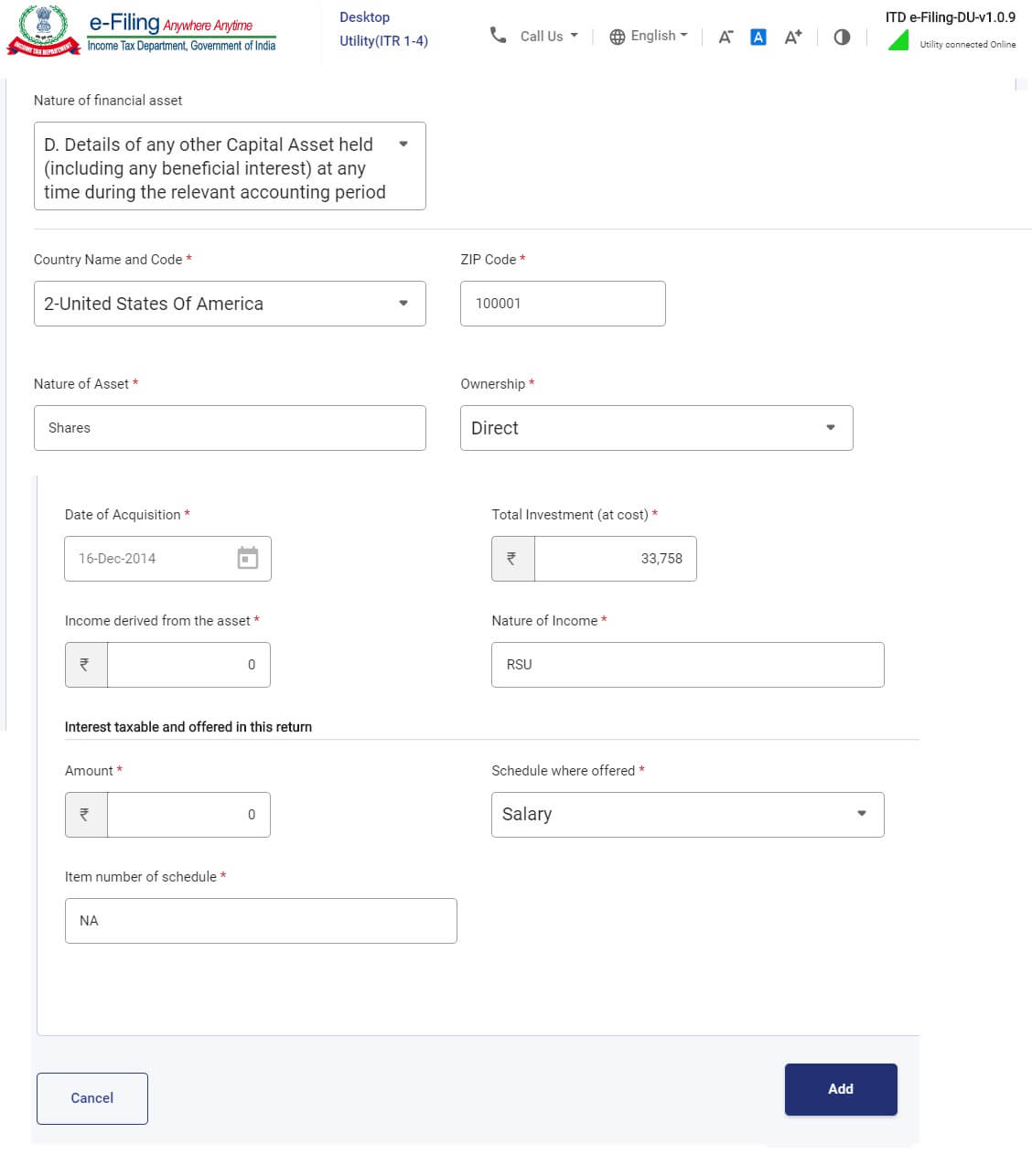
 Desk A3 and Desk D within the previous ITR
Desk A3 and Desk D within the previous ITR
Our article Are ESPP, ESOP in MNC to be filed in ITR as International Property? discusses What are overseas belongings? The International Asset schedule in ITR2.
Tax On Sale of RSU
One can solely promote the RSUs which can be vested. On the sale of the vested shares, the revenue earned is a capital achieve and is subsequently taxable in India.
For RSUs, the distinction between the vesting value or the Honest Market Worth and the sale value is the capital features.
Because the RSUs of the MNCs are usually not listed on the Indian inventory trade and no STT(Safety Transaction Tax) is paid so the definition of a long run and short-term capital features is completely different from the shares listed on Indian inventory trade like BSE and NSE.
From FY 2016-17 i,e for the sale of unlisted shares on or after 1st April 2016 UNLISTED fairness shares is given under. This capital achieve should be declared in Schedule CG of ITR in order that tax could also be suitably charged
- short-term capital belongings – when offered inside 24 months of holding them. Quick-term features are taxed at worker’s earnings tax slab charges
- long-term capital belongings – when offered after 24 months of holding them. Lengthy-term features are taxed at 20% with indexation (so part 48 which makes use of Indexation applies)
The earnings tax Act in India act differentiates between the tax on capital features of listed and unlisted shares.
- Listed shares are these which can be listed on Indian inventory exchanges, reminiscent of TCS, HDFC Financial institution, and so on.
- Unlisted shares are these that aren’t listed on Indian exchanges, no matter whether or not they’re of Indian firms or overseas firms listed on overseas exchanges reminiscent of Google, Microsoft, Apple, and so on.
The tax therapy on capital features which can be unlisted in India or listed out of India is identical. So in case you personal shares of an American firm, this firm will not be listed in India, therefore it’s thought of unlisted for the aim of taxes in India.
The interval of holding begins from the vesting date as much as the date of sale
The desk under reveals the instance of Quick Time period Capital Achieve and Lengthy-term Capital Achieve
| On the time of | Items | Date | FMV of share(USD) | Tax to be paid | In earnings tax return |
| Grant | 240 | 12-Dec-13 | Not Relevant | nil | Not Relevant |
| Vesting | 70 Vested
49 transferred |
12-Dec-14 | 17.89
1 USD = 62.90 Rs CII of yr 240 |
Tax of 30% taken by promoting 21 shares
Earnings Tax = 70 * 17.89* 62.90=78770 |
Perquiste Earnings as Earnings from Wage.
Taxed as per worker’s Earnings Tax Slab Price |
| Sale of shares if unlisted | 20 | 31-Jul-15 | 20.96
1 USD = 63.60 Rs |
Quick Time period Capital Achieve= 20* ((63.60*20.96)-(62.90* 17.89))= Rs 4,155.5 | Underneath Capital Positive factors (quick time period capital features)
Taxed as per Earnings Tax slab of worker |
| Sale of shares if unlisted | 25 | 31-Jan-17 | 25.89
1USD = 67.15 CII of the yr 264 |
Listed bought value = 62.90 * 264/240 = 69.19
Lengthy-Time period Capital Achieve with indexation= 25*((67.15 * 25.890)-(69.19* 17.89)) = =25* (1738.5135 -1237.8091) = 25*500.7044=12517.61 Lengthy-Time period Capital Achieve tax(with indexation) = 20% of 12517.61=2503.522 |
Underneath Capital Positive factors (long run capital features)
Lengthy-Time period Capital Achieve with out indexation= 25*((67.15 * 25.890)-(62.90* 17.89)) = 15330.8125 Lengthy-Time period Capital Achieve tax(with out indexation) = 20% of 15,330.8125=3066.1625 |
Capital Loss
What if there may be loss on promoting shares? Fortunately Earnings Tax Division provides advantage of Setting of Capital Loss.
Set-Off Losses means adjusting the loss in opposition to the taxable earnings earned; after that, remaining the loss might be carried ahead to future years.
The taxpayer can not carry ahead losses to future years if the earnings tax return for the yr through which loss is incurred will not be filed on the Earnings Tax Web site inside the due date as per Sec 139(1).
If one has Quick time period capital loss, then it may be set off in opposition to short-term or long-term capital achieve from any capital asset(actual property, gold, debt mutual funds).
If the loss will not be set off solely, then it may be carried ahead for a interval of 8 years and adjusted in opposition to any short-term or long-term capital features made throughout these 8 years. However provided that he has filed his earnings tax return inside the due date.
Exhibiting Capital Positive factors in ITR
Half A of the Capital Positive factors Schedule offers for computation of quick‐time period capital features (STCG) from the sale of several types of capital belongings. Out of this, merchandise No. A3 and A4 are relevant just for non‐residents.
Half B of this Capital Positive factors Schedule offers for the computation of lengthy‐time period capital features (LTCG) from the sale of several types of capital belongings. Out of this, merchandise No. B5, B6, B7, and B8 are relevant just for non‐residents
Select the Schedule Capital Positive factors
In Capital Achieve Schedule on the market of shares of MNC not listed on Indian Inventory Trade select Sale of Property apart from listed. (along with another capital achieve you’d have)
Then Select Quick Time period Achieve/Lengthy Time period Achieve
- Quick Time period Achieve in case you held shares for lower than 24 months
- Lengthy Time period Achieve in case you held shares for greater than 24 months
The brand new ITR Utility reveals the small print that have to be stuffed for Capital Positive factors
Capital Positive factors in Outdated ITR
Setting of the Capital Loss
When you’ve got a capital loss then in abstract you’d see the loss an instance of which is proven within the picture under. If there’s a Capital Loss, it might be mirrored as a damaging worth
Click on on Schedule CYLA (Present 12 months Losses Changes). The main points entered in Capital Achieve Schedules will mirror in Set-Off/ Carry Ahead Schedules.
Word: Set off & carry Ahead Schedules will fetch knowledge from Capital achieve Schedule. The taxpayer needn’t enter the small print once more in these schedules.
Click on on Schedule CFL (Carry Ahead Losses)
The unadjusted losses of that monetary yr shall be carried ahead.
Within the following years ITR you possibly can alter your capital features in opposition to this loss and cut back your tax legal responsibility.
DTAA and RSU
Double taxation refers back to the state of affairs when a person is taxed greater than as soon as on the identical earnings, asset or monetary transaction.The Double Tax Avoidance Agreements (DTAA) is bilateral agreements entered into between two nations, in our case, between India and one other overseas state. The fundamental goal is to keep away from, taxation of earnings in each the nations (i.e. Double taxation of similar earnings) and to advertise and foster financial commerce and funding between the 2 nations.
US MNCs with workers in India usually submit W-8BEN to US brokers to keep away from any withholding associated to US taxes. Nevertheless, the taxes and so on are deducted for the workers in India. These are reported in perquisites kind. (as defined above). The picture under reveals how one has to certify W-8BEN kind on ETrade for US. Extra particulars within the video right here.
If any tax is deducted in US then US IRS division will ship Kind just like Kind 16 to your deal with.
Advance Tax on Capital Achieve of RSU
Advance Tax guidelines require that one’s tax dues (estimated for the entire yr) should be paid prematurely. Advance tax is paid in installments. Whereas the employer deducts TDS when your RSUs get vested, one could need to deposit advance tax if one earns capital features.
Non-payment or delayed cost of advance tax ends in penal curiosity underneath sections 234B and 234C.
You should pay Advance Tax on RSUs solely while you promote the RSUs and the revenue is greater than 10,000 Rs. You should pay an acceptable proportion of it earlier than the closest due date. So in case you offered between 16 June and 15 Sep you should pay 45% earlier than 15 Sep.
| Due Date | Advance Tax Payable |
|---|---|
| On or earlier than fifteenth June | 15% of advance tax much less advance tax already paid |
| On or earlier than fifteenth September | 45% of advance tax much less advance tax already paid |
| On or earlier than fifteenth December | 75% of advance tax much less advance tax already paid |
| On or earlier than fifteenth March | 100% of advance tax much less advance tax already paid |
Nevertheless, it might be laborious to estimate tax on capital features and deposit advance tax within the first few installments if a sale occurred later within the yr. Subsequently when advance tax installments are being paid, no penal curiosity is charged the place installment is brief attributable to capital features. Remaining installment (after the sale of shares) of advance tax at any time when due should embody the tax on capital features.
Relying on the time length between the vesting date and the sale date, the revenue can both qualify for short-term or long-term capital features tax. For RSUs, the acquisition date is the vesting date.
Our article Advance Tax:Particulars-What, How, Why is about Advance Tax for people.
Disclaimer: This info is for academic functions solely. We’ve got tried to supply the data to the most effective of our skill. However please seek the advice of your CA, tax guide. Bemoneyaware.com will not be accountable for any legal responsibility on info supplied on the location.
Associated Articles:
- Wage, Internet Wage, Gross Wage, Price to Firm: What’s the distinction
- Wage, Allowances, Dearness Allowance, Authorities Wage, Pay Fee
- Understanding Variable Pay
- Understanding Kind 16: Half I
- How To Fill Wage Particulars in ITR2, ITR1
- HRA Exemption, Calculation, Tax, and Earnings Tax Return
- How are Dividends of Worldwide or International Shares taxed? How you can present in ITR
Hope this text helped in understanding What are RSUs? Why are RSUs given? What’s the vesting date? When are RSU taxed? Is there a capital achieve on promoting RSU? What’s the capital achieve from promoting RSU? How you can present these in ITR


